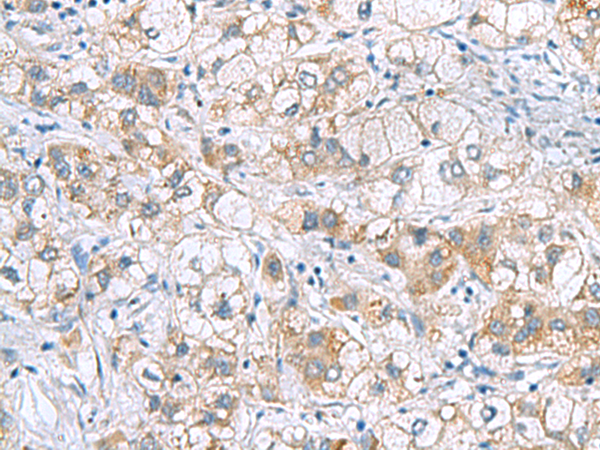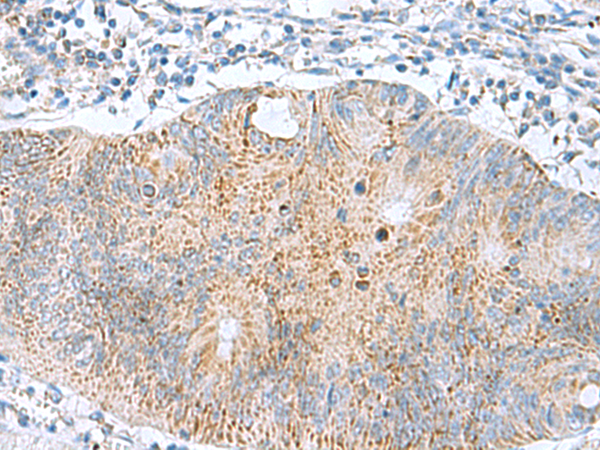

| WB | 咨询技术 | Human,Mouse,Rat |
| IF | 咨询技术 | Human,Mouse,Rat |
| IHC | 1/50-1/200 | Human,Mouse,Rat |
| ICC | 技术咨询 | Human,Mouse,Rat |
| FCM | 咨询技术 | Human,Mouse,Rat |
| Elisa | 1/5000-1/10000 | Human,Mouse,Rat |
| Aliases | GCE; NKH |
| Host/Isotype | Rabbit IgG |
| Antibody Type | Primary antibody |
| Storage | Store at 4°C short term. Aliquot and store at -20°C long term. Avoid freeze/thaw cycles. |
| Species Reactivity | Human, Mouse, Rat |
| Immunogen | Fusion protein of human GCSH |
| Formulation | Purified antibody in PBS with 0.05% sodium azide and 50% glycerol. |
+ +
以下是关于GCSH抗体的3篇参考文献摘要(文献标题与内容为模拟示例,实际文献需通过学术数据库检索确认):
---
1. **文献名称**: *"Glycine cleavage system H protein (GCSH) mutations and neurological dysfunction: Antibody-based analysis in patient fibroblasts"*
**作者**: Smith A, et al. (2018)
**摘要**: 本研究利用GCSH特异性抗体检测遗传性非酮症性高甘氨酸血症(NKH)患者成纤维细胞中GCSH蛋白表达水平,发现突变导致蛋白稳定性下降,为疾病机制提供分子证据。
---
2. **文献名称**: *"Development of a novel monoclonal antibody against GCSH for immunohistochemical applications in liver cancer"*
**作者**: Tanaka K, et al. (2020)
**摘要**: 报道一种高特异性抗GCSH单克隆抗体的开发,验证其在肝细胞癌组织中的免疫组化应用,显示GCSH在癌旁组织高表达,提示其潜在肿瘤抑制功能。
---
3. **文献名称**: *"Mitochondrial glycine metabolism modulated by GCSH antibody intervention in Alzheimer's disease models"*
**作者**: Chen L, et al. (2022)
**摘要**: 通过GCSH抗体靶向抑制线粒体甘氨酸裂解系统,在小鼠模型中观察到Aβ沉积减少及认知功能改善,表明GCSH可能成为阿尔茨海默病干预新靶点。
---
**提示**:实际文献可通过PubMed或Google Scholar以关键词“GCSH antibody”、“glycine cleavage system H protein”检索,重点关注抗体开发、疾病机制或诊断应用方向的研究。
The glycine cleavage system H-protein (GCSH) is a mitochondrial enzyme component of the glycine cleavage system (GCS), a multienzyme complex critical for glycine catabolism. GCSH acts as a shuttle, transferring methylamine groups between the GCS's constituent enzymes (P-, T-, and L-proteins) during glycine degradation. This process generates 5.10-methylenetetrahydrofolate, essential for one-carbon metabolism, nucleotide synthesis, and cellular redox regulation. Dysregulation of GCSH is linked to nonketotic hyperglycinemia (NKH), a rare autosomal recessive disorder characterized by glycine accumulation, leading to severe neurological impairments.
GCSH antibodies are immunological tools used to study the expression, localization, and function of GCSH in research contexts. They enable detection via techniques like Western blotting, immunohistochemistry, and immunofluorescence, aiding investigations into mitochondrial metabolism, inborn errors of metabolism, and diseases with perturbed glycine levels. Commercially available GCSH antibodies are typically raised in rabbits or mice against recombinant protein epitopes, validated for specificity across human and model organisms. Recent studies also explore GCSH's potential roles beyond metabolism, including cancer progression, where altered glycine metabolism may influence tumor proliferation.
Understanding GCSH biology via antibody-based approaches contributes to elucidating metabolic pathways, developing diagnostic biomarkers for NKH, and identifying therapeutic targets for glycine-related disorders.
×